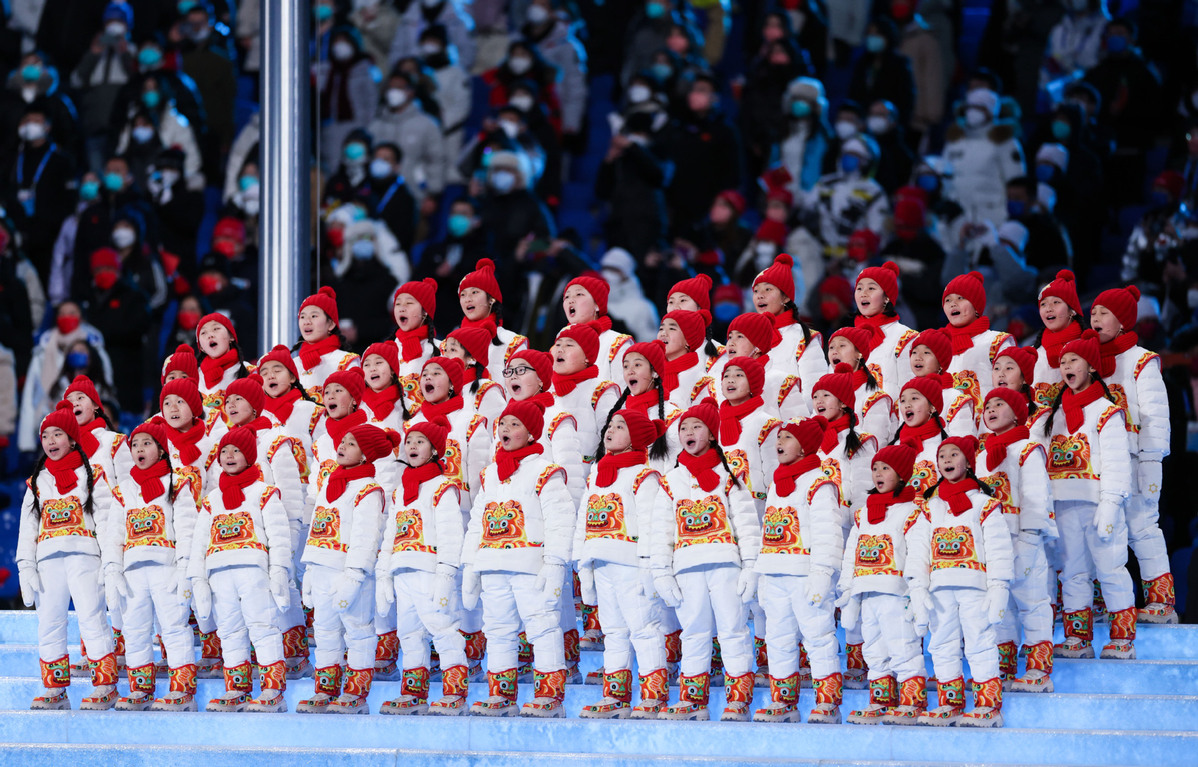Actors perform prior to the opening ceremony of the Beijing 2022 Olympic Winter Games at the National Stadium in Beijing, Feb 4, 2022. [Photo/Xinhua]
It is time to present a modern China and ordinary Chinese people, especially the younger generation, to the world instead of always focusing on the country's 5,000-year history, Zhang Yimou, chief director of the opening ceremony of the Beijing Winter Olympic Games, said in Beijing on Friday.
About 3,000 people from all walks of life participated in the 140-minute opening ceremony, with more than 90 percent of them students between the ages of 5 and 25.
"There were no stars, no celebrities or professional performers. Just ordinary people showing the world who they are," said Zhang, who also directed the 2008 Beijing Olympic Games ceremony, which offered audiences a glimpse of China's glorious history.
He said the concept of the 2022 opening ceremony was totally different from that of the 2008 Summer Games.
"Compared with the ceremony in 2008 illustrating our history, this one showed a modern China. It was a salute to the people," said the director, who attributed the shift to the country's confidence in its culture.
The square dancers from the ages of 5 to over 70 performing in the 30-minute warm-up show before the ceremony were all residents of Beijing and cities in nearby Hebei province. Square dancing is a popular national activity in China, where it's seen as a form of daily exercise.
The children singing the Olympic anthem and the Beijing 2022 Winter Olympics theme song were primary school students, many with no stage experience, according to Wang Jun, who was in charge of the selection and training of participants for the opening ceremony.
Training, which began in October, mainly took place on weekends in schools or workplaces.
When the rehearsals were held in Beijing's National Stadium — where the opening ceremony was held — the organizers had to provide desks for the children to do homework during breaks, because most of them were at school. Sometimes, teachers would hold classes on site while students were waiting to rehearse.
Wang also took part in the selection of performers for the opening ceremony of the 2008 Beijing Olympics. He said that while certain standards were required of performers back then, like good looks and good physiques, this time, the only requirement was a willingness to participate.
 Members of a children's choir sing the Olympic Anthem at the opening ceremony in Beijing on Friday. CAO CAN/XINHUAThe children singing the Olympic anthem during the opening ceremony came from Fuping, a small county in Hebei. Many live in villages and their parents are either farmers or migrant workers.
Members of a children's choir sing the Olympic Anthem at the opening ceremony in Beijing on Friday. CAO CAN/XINHUAThe children singing the Olympic anthem during the opening ceremony came from Fuping, a small county in Hebei. Many live in villages and their parents are either farmers or migrant workers.
It was the first time the 44 little singers had left home to perform in Beijing, a moment even more memorable for taking place during Chinese Lunar New Year, usually a time for families to get together.
"Most don't have any singing experience. It will be a meaningful experience for them their whole lives," said their headmaster, Liu Kai.
Referring to the 800 children who sang the Beijing Winter Olympic theme song, Zhang described the performance as being more like play.
Through motion capture technology, the children were able to interact with projections of snowflakes, that moved and changed shapes on the giant screen beneath their feet.
"They were not performing. They were playing, all very happy and relaxed," Zhang said.
College students, seniors and model workers from all walks of life were also part of the cast, which was smaller than that of the 2008 summer Games, when there were 15,000 performers.
Cold weather and the COVID-19 pandemic were a few of the reasons Zhang gave for the smaller cast. He added that the technology used during the ceremony also helped to reduce the number of participants.
"We wanted to present a modern China and the lives of ordinary Chinese people. There were no great performers, but everyone was sincere and that touched the audiences' hearts," he said.
